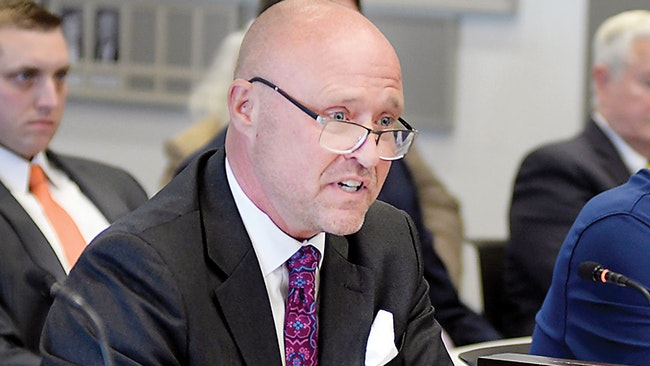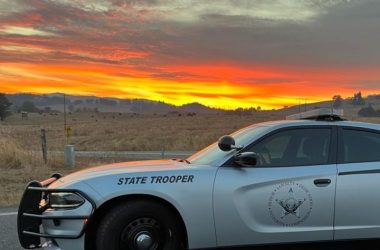
Greg Smith, Malheur County economic development director, testifies to the Transportation Commission about the reload facility planned in Nyssa. (Enterprise file photo)
Greg Smith, Malheur County’s economic development director, warned in January that releasing public documents could jeopardize the proposed Treasure Valley Reload Center.
Smith hoped to forestall an order from Malheur County District Attorney Dave Goldthorpe that the documents should be released to the Malheur Enterprise.
“The entire TVRC project is at stake,” Smith wrote in his Jan 29 letter.
Goldthorpe instead issued a rare order requiring Smith and the Malheur County Economic Development Department to turn over the documents.
The order came during the Enterprise’s continuing effort to obtain government records about the Nyssa project, allowed by the Oregon Public Records Law.
Smith resisted disclosing documents to show the financial viability of the project and then in some instances only belatedly acknowledged that documents even existed.
The Enterprise also had to challenge the Oregon Department of Transportation’s decision in January to withhold documents it used to justify releasing about $25 million to Malheur County. The agency subsequently reversed course after the newspaper sought an order from Attorney General Ellen Rosenblum that the records be turned over.
The fight for documents enlisted the Local Legal Initiative of the national Reporters Committee for Freedom of the Press. Attorney Ellen Osoinach, staff attorney for the Oregon initiative, represented the Enterprise to pursue the public records.
“Journalists, in particular, use Oregon’s law to tell important stories about what’s happening in government that might otherwise be kept secret,” Osoinach said. “The law is intended to empower people to stay informed about the workings of our government so when agencies unlawfully prevent access, it’s a big red flag.”
Katie Townsend, Reporters Committee legal director in Washington, said the Local Legal Initiative was launched “to provide local journalists and news organizations with the direct legal support they need to push back against denials of public records requests.”
She described such records as “an important tool” for reporters.
“Access to public records from state and local agencies allows reporters to dig deep into issues that are affecting their communities, and keep residents informed about what elected officials and government employees are doing about the issues that really affect residents’ day-to-day lives,” she said.
The records request that ended up in Goldthorpe’s office sought records about a September meeting involving county and state officials, onion shippers and agents of Americold, the company expected to run the Nyssa center.
Smith didn’t respond to the Enterprise’s Oct. 21 request until the newspaper sought Goldthorpe’s intervention. Smith initially wouldn’t release records related to the meeting and subsequently provided only a redacted version.
Smith contested a petition filed by the Enterprise seeking the records, saying the September session was a “private meeting” that included Americold and Treasure Valley Onion Shippers, a consortium formed to contract for onion shipments.
He warned Goldthorpe that there was a risk to disclosure.
“If information is released too soon both TVOS and Americold will walk away from TVRC and TVRC will simply not be built or delayed,” Smith wrote on Jan. 29.
Goldthorpe on Feb. 5 issued a rare public records order, directing Smith to release the records, dismissing Smith’s claim they were exempt from public disclosure.
“It should not take the Malheur Enterprise filing a petition with my office to achieve production this often,” Goldthorpe said in an email delivering his order. “If I determine any further refusals or denials are unjustified, I will consider imposing fines.”
At the same time, Smith was trying to help the state Transportation Department withhold other documents related to the Nyssa project.
The county is required to submit documents to the state as a way to get about $26 million set aside for the Nyssa project. The Enterprise on Jan. 8 sought from the Transportation Department records listed as showing “updates and financial statements” related to operating the Nyssa terminal.
The Transportation Department said Jan. 21 it wouldn’t release the documents because they were “trade secrets” legally protected from disclosure.
On Feb. 5, the Enterprise petitioned the state Justice Department for an order requiring the Transportation Department to release the documents, a process allowed under Oregon law.
“The ‘trade secrets’ exemption is intended to protect private business information – not information proffered by one government agency to another in support of a public benefit,” the petition said.
Email records show that the state agency turned to Smith and to Americold for help defending the secrecy.
“ODOT is evaluating whether or not it will continue to assert the trade secrets exemption in light of the petition and its arguments for disclosure,” an agency official wrote to Smith.
Doug Olmstead, senior director of business development, advised Smith that releasing the information would harm the company’s efforts. He enlisted the company’s attorneys for help, writing in a Feb. 10 email that the state agency needs “some strong language in defense of their denial of release.”
Seven days later, the Transportation Department responded to the Justice Department that it was standing its ground, outlining its reasoning in a 5-page letter. The agency said it had only two documents it wasn’t disclosing to the public – a 17-page presentation by Americold on how it would operate the Nyssa site and the company’s Jan. 6 letter with more information about the Nyssa project.
The Enterprise on Feb. 22 pressed for the Justice Department to still order the disclosure because they were central to the state’s decision to release public money.
The petition was still pending when three days later the Transportation Department notified the Enterprise that “upon further review” it would release Americold’s letter and most of its 17-page presentation.
“We want to release everything we can,” according to Cooper Brown, Transportation Department assistant director of operations, in explaining the agency’s change.
He said the agency pushed back on Americold and its claims that information was a trade secret, eventually getting the corporation’s agreement that the material could be released.
“We did not act contrary to Americold’s wishes,” Brown said.
RELATED STORIES:
WATCHDOG: Construction of Malheur County rail center on hold as key contract talks drag on
Decision by state commission clears the way for construction of Malheur County rail facility
Nyssa rail center gets two thumbs up as construction start looms
Rail project leaps over another hurdle with completion of appraisal
WATCHDOG: Malheur County’s bid to grab $15 million in federal money stymied by errors in application
Malheur County needs $15 million for its industrial park. A two-year effort to get it flopped.
YOU CAN SUPPORT THIS KIND OF WORK
The Enterprise relies on community support to fund vital local journalism. You can help us do more.
SUBSCRIBE: A monthly digital subscription is $5 a month.
GIFT: Give someone you know a subscription.
ONE-TIME PAYMENT: Contribute, knowing your support goes towards more local journalism you can trust.




